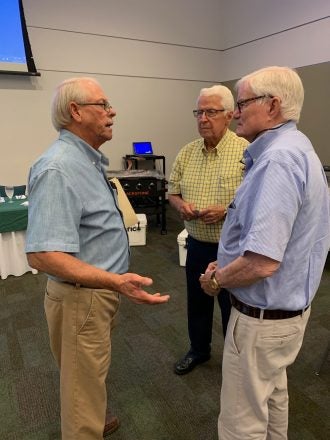Rotary learns about the corn market at Tuesday’s meeting
Published 3:28 pm Tuesday, September 10, 2019

- Rotarians Charles Tyson, center, and Ted Mauldin, right, speak with Carl Lynn following his presentation.
Carl Lynn was the guest speaker at Rotary on Tuesday. His topic was corn, a subject he knows plenty about, having been in the business for 30 years.
He and Glenn Heard are partners in Sweet Corn Co-op, and are probably the biggest corn producers in the county. Seventy-five percent of their corn is bi-color and they market in Canada in addition to United States grocers.
With the aid of a video production he explained how the crop is planted each spring and again in fall, using a GPS driven all electric tractor with eight spreaders used in the application of seed, fertilizer and herbicides. They plant for over 60 days, and it takes an average of 79 days to mature in the spring, a figure that drops to 65 for the fall crop.
Next comes the harvest and marketing, which are closely related. The buyers determine the sale. “It has to be sold before we harvest,” he explained. They have used the same marketing contractor in South Florida for 24 years, and the same Florida harvesting company for 22 years. The crops are sold and shipped to chain store distribution centers who determine what type of boxes they want to be used.
Many of the shipments are made in the familiar wooden crates made by Eberta Crate here in Bainbridge, while some food stores prefer the black plastic boxes, or the white ones that are recyclable.
Picking the crop is a huge undertaking. The very tops of the plants are cut back by machine, followed closely by a crew of 40 people who hand pull the ears and toss them into the crates. Each packer has a number that goes on the package they fill and they are paid according to the number of boxes they fill.
The containers are then taken by trucks to the storage center where they are again labeled with bar codes with information that identifies the date they were planted, harvested, stored and shipped. This information is kept in files for three years.
Food safety is always first in thought, and if there are ever any problems they can trace the suspected corn to its origin. Two people are employed to document and keep up to date on food safety.
They also participate in a food audit yearly, sample the water before they plant and each 30 days thereafter.
The company was hard hit by Hurricane Michael. The winds destroyed hundreds of acres and tore up irrigation systems. It also demolished the company cooler in Iron City that has since been rebuilt.
Lynn said the four area county around Decatur is blessed for growing corn with great natural resources, including water.





